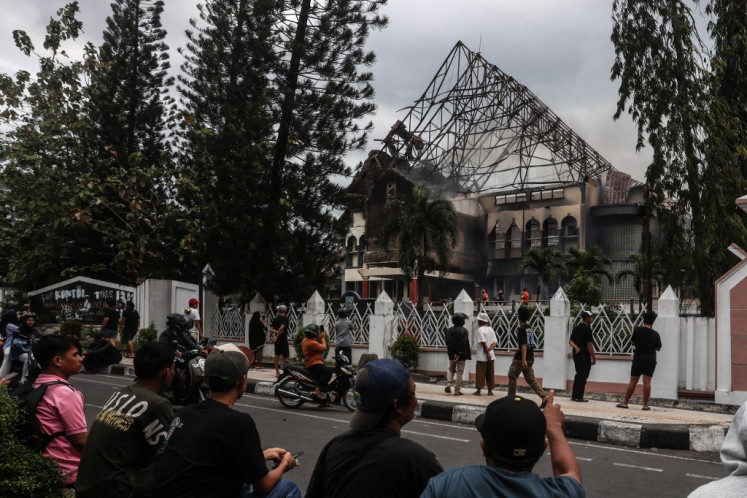Popular Reads
Top Results
Can't find what you're looking for?
View all search resultsPopular Reads
Top Results
Can't find what you're looking for?
View all search resultsInequality, Indonesia's unfinished business
Indonesia is now one of the six largest middle-income economies (World Bank, ICP 2011), thanks to its convincing economic growth, which has become a benchmark for development
Change text size
Gift Premium Articles
to Anyone
I
ndonesia is now one of the six largest middle-income economies (World Bank, ICP 2011), thanks to its convincing economic growth, which has become a benchmark for development. However, this achievement has
also left the problem of inequality unresolved.
In December 2011, or about two years into the second term of President Susilo Bambang Yudhoyono, the Organization for Economic Cooperation and Development (OECD) released a report on why inequality kept rising with a special focus on emerging economies like Indonesia.
The report said Indonesia's disparity was alarming as indicated by the Gini ratio, which had reached a record high of 0.41. In addition, Indonesia was facing the mounting challenges of worrying poverty levels, slow reduction in unemployment rates and a lack of social security for all citizens.
The SBY administration certainly did not turn a blind eye to the OECD report. In the medium'term development planning document 2009'2014, the challenges were identified but unfortunately were not adequately addressed. The administration has left two major problems of development: an increasing trend of inequality and the lack of quality development for all.
With relatively high and stable economic growth, inequalities will pose a hidden threat particularly as the state budget continues to expand each year.
In the long run, an ever widening gap can incite social resentment as the people demand more certainty, security guarantees and protection without exception. In short, Indonesia today requires policies and institutional arrangements that are designed to minimize injustice, vulnerability and inequality.
The two presidential candidates face two major challenges. The first is to create economic growth that is amenable to all citizens, including the poor. The second is to create social protection policies which at the same time are also friendly to economic growth.
As the French economist, Thomas Piketty has suggested in his recent magnum opus Capital in the Twenty'First Century, Indonesia may consider two important solutions to address inequality.
First, by promoting policies that would support individuals' capability expansion such as through
education, training and skills and technology. And second, by considering policies that can minimize disparities.
If Indonesia drops the first option, it is likely to face a shortfall of workers educated to the secondary and tertiary levels of at least of 9 million ' nearly the population of Jakarta today (McKinsey, 2012). Offering universal access to high'quality education can ensure that all citizens, regardless of their background, start on a more level playing field, thereby combating inequality for the next generation.
In addition, Indonesia could consider revitalizing workshop and training centers. Besides improving skills, it could motivate Indonesian apprentices and migrant workers to look for jobs that demand more skills, which will eventually increase their income.
Meanwhile, the latter option may require more political support to make it feasible.
The next government needs to encourage a market that promotes justice rather than inequality. Among the ways this can be considered is introducing a tax for the super'rich. This breakthrough has been practiced in France by President François Hollande.
Indonesia requires taxation reform of at least three major priorities: optimization of tax collection; expansion of tax rates (brackets); and transparency and accountability in the tax and transfer system.
Another method that is worth applying is revisiting the minimum-wage policy. Growth of real average monthly wages in Indonesia has declined from 10.4 percent per annum in 2000'2005 to '0.3 percent annually in 2009.
Currently, Indonesia applies a minimum-wage system based on monthly pay, yet with a lack of protection. Worse, it allows companies not to increase minimum wages, under albeit with certain conditions.
Therefore, Indonesia may consider practices in other middle'income countries where an hourly minimum wage is in place.
Increasing the monthly minimum wage will not put money in the pockets of workers. A higher minimum wage may positively affect economic growth since it both stimulates human development and helps reduce the income gap.
The third option is avoiding the current administration's mistake in massively subsidizing energy consumption. A recent study has revealed that the biggest fault of energy subsidies is their inability to reduce poverty.
Instead, the subsidies are much more meaningful when spent on agriculture. The survey found that almost 65 percent of the poor's consumption expenditure was on food.
Another method is to consider a basic-income policy. This policy is not new to Indonesia as the government adopted it in the form of the direct cash assistance (BLT) in 2005 and recently through the temporary direct cash assistance (BLSM).
The cash transfer model has been incorporated into the Family Hope Program (PKH) since 2007. Similar to basic income, the cash transfer through the PKH can be designed for a longer period (not temporary) especially for families enduring abject poverty.
This income guarantee scheme refers to an income benefit provided in cash and unconditionally to all citizens. Every individual (not household) should receive the same amount of basic income regularly on a long'term basis.
Basic income therefore is not simply to alleviate poverty and social inequalities, but also to prevent impoverishment and disparities. Nevertheless, it can also be seen as part of an effort to reduce multidimensional poverty or prevent the unemployment trap.
As the presidential election nears, citizens are being encouraged to consider voting for a presidential candidate who can answer Indonesia's current development challenges of quality and equitable growth.
Indonesia does not really need political gimmicks on a sovereign or self'reliant economy.
The writer is a program manager of the Tifa Foundation/Open Society Foundation Indonesia. The views expressed are his own.










